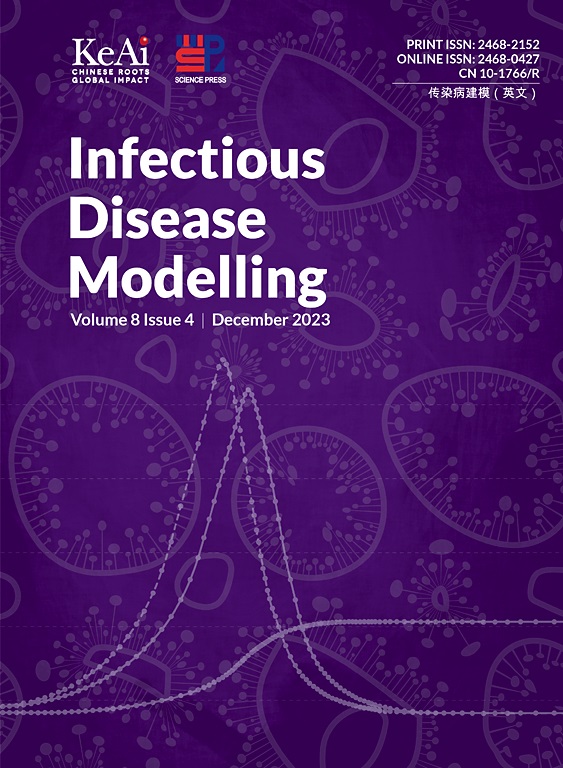有限理性父母对儿童新免疫的接种博弈
IF 2.5
3区 医学
Q1 Medicine
引用次数: 0
摘要
传染病通过疾病引起的发病率、死亡率、生产力丧失和不平等对社会造成危害。因此,控制和预防它们对公共卫生和社会福祉至关重要。然而,社会可能会因为不遵守公共卫生建议而阻碍控制疾病传播的努力,例如通过疫苗犹豫。已利用各种疾病传播模型来帮助决策者应对(重新)出现的疫情。这些模型在评估公共卫生政策有效性方面的有用性在很大程度上取决于人的行为。本文介绍了一种新的儿童免疫接种的父母行为模型。该模型结合了社会特征、社会规范和有限理性。我们将这个模型与儿童疾病的动态结合起来,通过一个标准的易感-感染-康复模型来描述,以提供一个关于疫苗接受动态的详细视角。研究发现,该行为模型提供了一个新的种群博弈论复制因子动力学方程,该方程具有类熵项。有趣的是,社会规范和有限理性通过一种新的功能在塑造疫苗摄取方面发挥了至关重要的作用,我们称之为关键的社会疫苗成本。结果表明,将疫苗成本降低到临界社会疫苗成本以下和提高初始接受率可以增加疾病消除的可能性。逐步增加疫苗接种费用,作为一种消除疾病的适应性动态政策,也是可能的。特别是,强烈的社会规范和低水平的有限理性,即使在疾病在社会中的基本繁殖数量很大的情况下,也对疾病的根除起到了积极的作用。本文章由计算机程序翻译,如有差异,请以英文原文为准。
Vaccination games of boundedly rational parents toward new childhood immunization
Infectious diseases harm societies through disease-induced morbidity, mortality, loss of productivity, and inequality. Thus, controlling and preventing them is critical for public health and societal well-being. However, societies can hinder efforts to control the spread of diseases by failing to adhere to public health recommendations, such as through vaccine hesitancy. Various disease-transmission models have been utilized to help policymakers respond to (re)emerging outbreaks. The usefulness of such models in assessing the effectiveness of public health policies is significantly dependent on human behavior. This paper introduces a new model of parental behavior toward a new childhood immunization. The model incorporates societal features, social norms, and bounded rationality. We integrate this model with the dynamics of childhood disease, as depicted by a standard susceptible-infected-recovered model, to offer a detailed perspective on vaccine acceptance dynamics. We found that the behavioral model provides a new population game theory's replicator dynamical equation with an entropy-like term. Interestingly, societal norms and bounded rationality play a crucial role in shaping vaccine uptake through a novel function, which we term the critical societal vaccine cost. The results suggest that reduced vaccine costs below the critical societal vaccine cost and higher initial acceptance rates increase the probability of disease elimination. A gradual increase in vaccination costs, as an adaptive dynamic policy for disease eradication, is also possible. In particular, strong social norms and low levels of bounded rationality positively contribute to disease eradication even when the basic reproduction number of the disease in that society is large.
求助全文
通过发布文献求助,成功后即可免费获取论文全文。
去求助
来源期刊

Infectious Disease Modelling
Mathematics-Applied Mathematics
CiteScore
17.00
自引率
3.40%
发文量
73
审稿时长
17 weeks
期刊介绍:
Infectious Disease Modelling is an open access journal that undergoes peer-review. Its main objective is to facilitate research that combines mathematical modelling, retrieval and analysis of infection disease data, and public health decision support. The journal actively encourages original research that improves this interface, as well as review articles that highlight innovative methodologies relevant to data collection, informatics, and policy making in the field of public health.
 求助内容:
求助内容: 应助结果提醒方式:
应助结果提醒方式:


